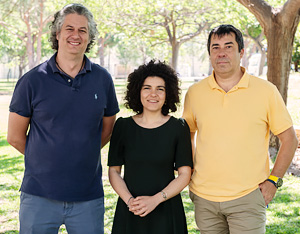Ai and climate change
"Stopping AI research does not help the fight against climate change"
[ 30/05/2023 ]
Last March, AI experts and business leaders worldwide strongly called for a pause in developing large AI systems. Stuart Russell, Steve Wozniak, Max Tegmark, and Elon Musk, among others, wrote an open letter calling for a pause of at least six months because otherwise, the systems could pose a risk to society and humanity.
Now, a team from the Universitat Politècnica de València (UPV), the KTH Royal Institute of Technology in Sweden and the University of Alicante (UA) argue, in an article published in Nature Climate Change, that the development of Artificial Intelligence must continue "for the sake of the environment and our future".
"Great linguistic models encourage climate and sustainability research. We believe, without any doubt, that working on the regulation and validation of AI models would bring far more benefits to society than stopping their development," says Francesca Larosa, a researcher at the KTH Climate Action Centre and lead author of the paper.
The team from the UPV, the KTH Royal Institute of Technology and the University of Alicante have several reasons to argue that the development of Artificial Intelligence should continue. One of the most important is that natural language processing (NLP) AI techniques are critical to analysing climate change research.
In this regard, they give as an example the analysis of large datasets on sustainability and environment-related research. This analysis can complement the assessment reports carried out by the UN Climate Panel.
"PLN techniques can help to understand better climate change, the relationships between human activity and the present and future of our planet; they will help to more quickly rethink priorities for adapting to climate change," says Alberto Conejero, a researcher at the University Institute of Pure and Applied Mathematics (IUMPA) of the Universitat Politècnica de València and co-author of the article published in Nature Climate Change.
IUMPA-UPV has worked on the implementation of the language models and the analysis of the scientific literature to look for connections between articles published in specialised journals and the Sustainable Development Goals, assessing the possible repercussions of paralysing the application of these models.
"The diagnosis is clear: we are living through an urgent climate crisis, and, to address it, we must take advantage of all the tools at our disposal because you don't know if there will be a point of no return. AI allows us to explore a huge amount of information and show answers to many questions, helping to prescribe what actions could mitigate this crisis," adds Alberto Conejero.
"Stopping research in artificial intelligence and the development of new natural language-assisted models would delay our efforts in understanding and combating climate change because these technologies have become fundamental tools for the study of complex issues such as the causes, consequences and solutions of climate change," adds Javier García, professor of Inorganic Chemistry and director of the Laboratory of Molecular Nanotechnology (NANOMOL) at the University of Alicante.
In addition, the UPV, KTH and UA team points out that Natural Language Processing can also be used to generate new knowledge on climate change, "given that the development of AI models more powerful than GPT-4 does not stop. This includes the ability to analyse extensive documents, making identifying complex links and combinations between different written sources easier. AI tools also contribute to making information accessible," adds Sergio Hoyas, a researcher at IUMPA-UPV and co-author of the paper.
Artificial Intelligence and climate impact
In any case, the UPV, KTH and UA researchers acknowledge that the use of AI in the service of the environment is more complex, as training large linguistic models such as GPT-3 and GPT-4 entails environmental and economic costs. Estimating how much AI contributes to greenhouse gas emissions is controversial, but in their paper, the UPV, KTH and AU teams refer to recent studies that show that while AI helps the environment, it also harms it. The training of GPT-3, for example, with 175 billion parameters, is equivalent to 188 times the CO2 emissions of a one-way flight from New York to San Francisco. But at the same time, AI models help to optimise energy consumption and increase efficiency in high-emission sectors.
"In any case, on a balance of benefits and harms from AI, we believe that the impact of not taking advantage of techniques such as natural language processing would be very negative. Why would you restrict yourself to using the latest technology in an emergency like this? The Future of Life Institute seems to be obviating the problem of climate change. Stopping Artificial Intelligence does not help in the least in the fight against this climate crisis," concludes Alberto Conejero.
Reference
Larosa, F., Hoyas, S., García-Martínez, J. et al. Halting generative AI advancements may slow down progress in climate research. Nat. Clim. Chang. (2023). https://doi.org/10.1038/s41558-023-01686-5
Outstanding news
 ARWU 2023
ARWU 2023
The Shanghai ranking reaffirms the UPV as the best polytechnic in Spain for yet another year
 Science Meets Regions CV 2023
Science Meets Regions CV 2023
The UPV and the Almussafes City Council begin a collaboration in search of solutions to maintain the automobile sector in the Valencia Region
 Scientific reference
Scientific reference
Avelino Corma, Distinguished Research Assistant at the UPV, awarded an Honorary Doctorate by the University of Huelva
 Micronanofabs NTC UPV-PERTE CHIP Conference
Micronanofabs NTC UPV-PERTE CHIP Conference
María Marced, TSMC Europe president: "The sector's future is bright, the market is expected to double by 2030"
 Goya nomination
Goya nomination
Javier Polo, who holds a degree in Audiovisual Communication from the UPV, directs the successful short documentary Una terapia de mierda
 Sant Carles Medal 2023
Sant Carles Medal 2023
The Faculty of Fine Arts of the UPV awards the Sant Carles Medal 2023 to outstanding Valencian art and culture figures







